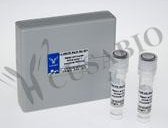HSP90AA1/HSP90AB1 AntibodyСпецификация| Объем | 50 мкл | | Синонимы | Heat shock protein HSP 90-alpha, Heat shock 86 kDa, HSP 86, HSP86, Lipopolysaccharide-associated protein 2, LAP-2, LPS-associated protein 2, Renal carcinoma antigen NY-REN-38, HSP90AA1, HSP90A, HSPC1, HSPCA, Heat shock protein HSP 90-beta, HSP 90, Heat shock 84 kDa, HSP 84, HSP84, HSP90AB1, HSP90B, HSPC2, HSPCB | | Тип антител | Recombinant Antibody | | Species | Human | | UniProt ID | P07900/P08238 | | Иммуноген | A synthesized peptide derived from human HSP90AA1/HSP90AB1 | | Видовая специфичность | Human, Rat | | Применение | ELISA, WB, FC, IP, Recommended dilution: WB:1:500-1:5000, IP:1:200-1:1000 | | Клональность | Monoclonal | | Изотип | Rabbit IgG | | Коньюгат | Non-conjugated | | Буффер | Rabbit IgG in phosphate buffered saline , pH 7.4, 150mM NaCl, 0.02% sodium azide and 50% glycerol. | | Форма | Liquid | | Хранение | Upon receipt, store at -20°C or -80°C. Avoid repeated freeze. | | Метод очистки | Affinity-chromatography | | Области исследований | Signal Transduction | | Аббревиатура | Heat shock protein HSP 90-alpha | | Примечание | Molecular chaperone that promotes the maturation, structural maintenance and proper regulation of specific target proteins involved for instance in cell cycle control and signal transduction. Undergoes a functional cycle that is linked to its ATPase activity which is essential for its chaperone activity. This cycle probably induces conformational changes in the client proteins, thereby causing their activation. Interacts dynamically with various co-chaperones that modulate its substrate recognition, ATPase cycle and chaperone function (PubMed:11274138, PubMed:15577939, PubMed:15937123, PubMed:27353360, PubMed:29127155). Engages with a range of client protein classes via its interaction with various co-chaperone proteins or complexes, that act as adapters, simultaneously able to interact with the specific client and the central chaperone itself (PubMed:29127155). Recruitment of ATP and co-chaperone followed by client protein forms a functional chaperone. After the completion of the chaperoning process, properly folded client protein and co-chaperone leave HSP90 in an ADP-bound partially open conformation and finally, ADP is released from HSP90 which acquires an open conformation for the next cycle (PubMed:27295069, PubMed:26991466). Apart from its chaperone activity, it also plays a role in the regulation of the transcription machinery. HSP90 and its co-chaperones modulate transcription at least at three different levels (PubMed:25973397). In the first place, they alter the steady-state levels of certain transcription factors in response to various physiological cues(PubMed:25973397). Second, they modulate the activity of certain epigenetic modifiers, such as histone deacetylases or DNA methyl transferases, and thereby respond to the change in the environment (PubMed:25973397). Third, they participate in the eviction of histones from the promoter region of certain genes and thereby turn on gene expression (PubMed:25973397). Binds bacterial lipopolysaccharide (LPS) and mediates LPS-induced inflammatory response, including TNF secretion by monocytes (PubMed:11276205). Antagonizes STUB1-mediated inhibition of TGF-beta signaling via inhibition of STUB1-mediated SMAD3 ubiquitination and degradation (PubMed:24613385). | | Ссылка на страницу на сайте производителя | ссылка | Western Blot
Positive WB detected in: Hela whole cell lysate, MCF-7 whole cell lysate, K562 whole cell lysate, HL-60 whole cell lysate, HepG2 whole cell lysate, A549 whole cell lysate, Jurkat whole cell lysate, PC3 whole cell lysate, Rat brain tissue
All lanes: Hsp90 alpha + beta antibody at 1.25µg/ml
Secondary
Goat polyclonal to rabbit IgG at 1/50000 dilution
Predicted band size: 90 KDa
Observed band size: 90 KDa
 | Immunoprecipitating Hsp90 alpha + beta in Hela whole cell lysate
Lane 1: Rabbit control IgG instead of CSB-RA010802A0HU in Hela whole cell lysate.
For western blotting, a HRP-conjugated Protein G antibody was used as the secondary antibody (1/2000)
Lane 2: CSB-RA010802A0HU (3µg) + Hela whole cell lysate (500µg)
Lane 3: Hela whole cell lysate (20µg)
 | Overlay histogram showing Jurkat cells stained with CSB-RA010802A0HU (red line) at 1:50. The cells were fixed with 70% Ethylalcohol (18h) and then permeabilized with 0.3% Triton X-100 for 2 min. The cells were then incubated in 1x PBS /10% normal goat serum to block non-specific protein-protein interactions followed by primary antibody for 1 h at 4°C. The secondary antibody used was FITC goat anti-rabbit IgG (H+L) at 1/200 dilution for 1 h at 4°C. Control antibody (green line) was used under the same conditions. Acquisition of >10,000 events was performed.
 | | | |
Информация для заказа| Область использования: | Производство: | Cusabio | | Метод: | Антитела | | Объем: | 50 мкл | | Кат. номер: | CSB-RA010802A0HU | | Цена (с НДС 20%): | по запросу | В корзину  |  Наименование: HSP90AA1/HSP90AB1 Antibody. Наименование: HSP90AA1/HSP90AB1 Antibody.
Примечание: дополнительная информация (на английском языке). |
|
